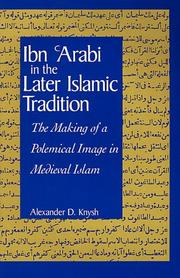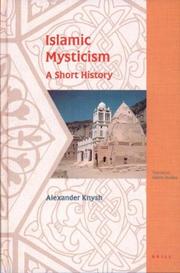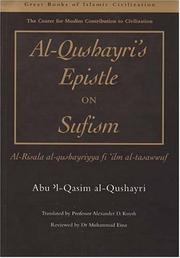| Listing 1 - 9 of 9 |
Sort by
|
Book
ISBN: 9781400887972 1400887976 9780691139098 Year: 2017 Publisher: Princeton, NJ
Abstract | Keywords | Export | Availability | Bookmark
 Loading...
Loading...Choose an application
- Reference Manager
- EndNote
- RefWorks (Direct export to RefWorks)
A pathbreaking history of Sufism, from the earliest centuries of Islam to the present. After centuries as the most important ascetic-mystical strand of Islam, Sufism saw a sharp decline in the twentieth century, only to experience a stunning revival in recent decades. In this comprehensive new history of Sufism from the earliest centuries of Islam to today, Alexander Knysh, a leading expert on the subject, reveals the tradition in all its richness. Knysh explores how Sufism has been viewed by both insiders and outsiders since its inception. He examines the key aspects of Sufism, from definitions and discourses to leadership, institutions, and practices. He devotes special attention to Sufi approaches to the Qur'an, drawing parallels with similar uses of scripture in Judaism and Christianity. He traces how Sufism grew from a set of simple moral-ethical precepts into a sophisticated tradition with professional Sufi masters (shaykhs) who became powerful players in Muslim public life but whose authority was challenged by those advocating the equality of all Muslims before God. Knysh also examines the roots of the ongoing conflict between the Sufis and their fundamentalist critics, the Salafis--a major fact of Muslim life today. Based on a wealth of primary and secondary sources, Sufism is an indispensable account of a vital aspect of Islam --
Mysticism --- RELIGION / Islam / General. --- Sufism --- Sufism. --- Islam --- History. --- Islam. --- Dark night of the soul --- Mystical theology --- Theology, Mystical --- Spiritual life --- Negative theology --- Abrahamic religions. --- Al-Ghazali. --- Al-Qushayri. --- Asceticism. --- Author. --- Bernard McGinn (theologian). --- Bruce Lincoln. --- Christian mysticism. --- Christianity and Islam. --- Christianity. --- Christopher Melchert. --- Dhikr. --- Dichotomy. --- Divine presence. --- Doctrine. --- Edward Said. --- Esoteric interpretation of the Quran. --- Exegesis. --- Fear of God. --- Fiqh. --- Font Bureau. --- God. --- Hadith. --- Heresy. --- Historiography. --- Ibn Khaldun. --- Ibn Taymiyyah. --- Idolatry. --- Illustration. --- Irfan. --- Islamic culture. --- Islamic fundamentalism. --- Islamic holy books. --- Islamic studies. --- Jews. --- Judaism. --- Judeo-Christian. --- Justification (theology). --- Kafir. --- Kashf. --- Literature. --- Louis Massignon. --- Mansur Al-Hallaj. --- Modernity. --- Monasticism. --- Mosque. --- Muhammad. --- Murid. --- Muslim world. --- Muslim. --- Mystical theology. --- Mysticism. --- Najm al-Din. --- Naqshbandi. --- Narrative. --- Occult. --- Orientalism. --- Orthodoxy. --- P. J. Conkwright. --- Persecution. --- Philosopher. --- Philosophy. --- Physician. --- Piety. --- Plotinus. --- Polemic. --- Political correctness. --- Presence of God (Catholicism). --- Princeton University Press. --- Pseudo-Dionysius the Areopagite. --- Quran. --- Religion. --- Religious studies. --- Religious text. --- Renunciation. --- Sadr al-Din al-Qunawi. --- Saint. --- Salafi movement. --- Sayyid. --- Sheikh. --- Silsila. --- Sufi cosmology. --- Sufi metaphysics. --- Sufi studies. --- Sunni Islam. --- Tariqa. --- The Sufis. --- Theology. --- Treatise. --- Ulama. --- Umberto Eco. --- Ummah. --- Wahhabism. --- William Chittick. --- World to come. --- World view. --- Worship. --- Writing.
Digital
ISBN: 9781400887972 9780691191621 Year: 2017 Publisher: Princeton, N.J. Princeton University Press
Abstract | Keywords | Export | Availability | Bookmark
 Loading...
Loading...Choose an application
- Reference Manager
- EndNote
- RefWorks (Direct export to RefWorks)

ISBN: 0585060304 9780585060309 0791439674 0791439682 1438409427 9780791439685 Year: 1999 Publisher: Albany : State University of New York Press,
Abstract | Keywords | Export | Availability | Bookmark
 Loading...
Loading...Choose an application
- Reference Manager
- EndNote
- RefWorks (Direct export to RefWorks)
This book examines the fierce theological controversy over the great Muslim mystical thinker Ibn 'Arabi (1165-1242)
Sufism. --- Sofism --- Mysticism --- Islam --- Ibn al-ʻArabī, --- Andalusi, Mehmet bin Ali, --- Ibn al-ʻArabī, Muḥyī al-Dīn Muḥammad ibn ʻAlī, --- Ibn ʻArabî, --- Ibn ʻArabi, Mohyiddin, --- İbn Arabî, Muhittin, --- Ibn ʻArabī, Muḥyī al-Dīn Muḥammad ibn ʻAlī, --- Ibn ʻArabī, Muḥyiddīn, --- Ibn-i ʻArabī, Muḥīuddīn Muḥammad bin ʻAlī T̤āʼī Undlusī ibn-i ʻArabī --- Ibn Surāqah, --- İbnʼül-arabî, Muhyiddîn, --- Magribi, Mehmet bin Ali, --- Mohyiddin ibn ʻArabi, --- Muḥammad bin ʻAlī T̤āʼī Undlusī ibn-i ʻArabī, Muḥīuddīn, --- Muḥammad ibn ʻAlī, Muḥyī al-Dīn ibn al-ʻArabī, --- Muhittin i̇bn Arabî, --- Muḥīuddīn Muḥammad bin ʻAlī T̤āʼī Undlusī ibn-i ʻArabī, --- Muhiy al Din ibn Arabi, --- Muḥyī al-Dīn ibn ʻArabī, --- Muḥyī al-Dīn Muḥammad ibn ʻAlī ibn al-ʻArabī, --- Muḥyī al-Dīn Muḥammad ibn ʻAlī ibn ʻArabī, --- Muḥyiddīn ibn ʻArabī, --- Muhyiddîn İbnʼül-arabî, --- Raʼīs al-Ṣūfīyah, --- Şeyh-i ekberi, --- Shaykh al-Akbar, --- Taʼi, Mehmet bin Ali, --- T̤āʼī Undlusī ibn-i ʻArabī, Muḥīuddīn Muḥammad bin ʻAlī, --- Undlusī ibn-i ʻArabī, Muḥīuddīn Muḥammad bin ʻAlī T̤āʼī, --- Ibnu Arabi, Muhyiddin, --- ابن العربي، --- ابن عربي --- ابن عربي، --- بن العربي --- لإبن العربي، --- محيى الدين بن عربي --- Muhyi al-Dīn ʿAbd Allāh Muḥammad ibn ʿAlī ibn Muḥammad ibn al-ʿArabī al-Ḥātimī al-Tā'ī al-Šayḫ al-Akbar

ISBN: 1283856395 900421576X 9789004215764 9004194622 9789004194625 9789004194625 9004194622 9004107177 9789004107175 Year: 2010 Volume: 1 Publisher: Leiden Brill
Abstract | Keywords | Export | Availability | Bookmark
 Loading...
Loading...Choose an application
- Reference Manager
- EndNote
- RefWorks (Direct export to RefWorks)
The book provides a general survey of the history of Islamic mysticism (Sufism) since its inception up to the modern time. It combines chronological and personality-based approaches to the subject with a thematic discussion of principal Sufi notions and institutions. Sufism is examined from a variety of different perspectives: as a vibrant social institution, a specific form of artistic expression (mainly poetic), an ascetic and contemplative practice, and a distinctive intellectual tradition that derived its vitality from a dialogue with other strands of Islamic thought. The book emphasizes the wide variety of Sufism's interactions with the society and its institutions from an ascetic withdrawal from the world to an active involvement in its affairs by individual Sufi masters and organizations. Islamic Mysticism by Knysh is a comprehensive survey of the interesting and fascinating world of Islamic Mysticism.
Sufism --- Mysticism --- Dark night of the soul --- Mystical theology --- Theology, Mystical --- Spiritual life --- Negative theology --- History. --- Islam --- Sufism. --- Islam. --- Sofism --- History --- 297.14 --- 297.14 Islam: religieus leven; ascese; devotie --- Islam: religieus leven; ascese; devotie --- Islam&delete& --- Sufism - History --- Mysticism - Islam - History
Book
ISBN: 9780691191621 069119162X 0691139091 1400887976 Year: 2019 Publisher: Princeton Oxford Princeton University Press
Abstract | Keywords | Export | Availability | Bookmark
Book
ISBN: 9004392610 9789004389823 9004389822 Year: 2023 Publisher: Leiden ; Boston : Brill,
Abstract | Keywords | Export | Availability | Bookmark
 Loading...
Loading...Choose an application
- Reference Manager
- EndNote
- RefWorks (Direct export to RefWorks)
"This volume discusses the origin and structure of the universe in mystical Islam (Sufism) and Islam's civilizational predecessors with special reference to parallel realms of existence and their interaction. Contributors address Sufi ideas about the fate of human beings in this and future life under three rubrics: (1) cosmogony and eschatology ("where do we come from?" and "where do we go?"); (2) conceptualizations of the world of the here-and-now ("where are we now?"); and (3) visualizations of realms of existence, their hierarchy and mutual relationships ("where are we in relation to other times and places?"). Contributors are Christian Lange, Alexander Knysh, Noah Gardiner, Stephen Hirtenstein, Saeko Yazaki, Jean-Jacques Thibon, Leah Kinberg, Sara Sviri, Munjed M. Murad, Simon O'Meara, Pierre Lory, Mathieu Terrier, Michael Ebstein, Binyamin Abrahamov and Frederick Colby"--
Islamic cosmology --- Sufism --- Cosmogony --- Islamic cosmology. --- Cosmogony. --- Doctrines.
Book
ISBN: 9781438439945 Year: 2012 Publisher: Albany : State University of New York Press,
Abstract | Keywords | Export | Availability | Bookmark
 Loading...
Loading...Choose an application
- Reference Manager
- EndNote
- RefWorks (Direct export to RefWorks)
Rêves --- Visions. --- Dreams --- Visions --- Aspect religieux --- Islam. --- Soufisme. --- Religious aspects --- Islam
Book
ISBN: 1438439954 1461904005 9781461904007 9781438439952 9781438439952 9781438439938 1438439938 1438439946 Year: 2012 Publisher: Albany, N.Y. : SUNY Press,
Abstract | Keywords | Export | Availability | Bookmark
 Loading...
Loading...Choose an application
- Reference Manager
- EndNote
- RefWorks (Direct export to RefWorks)
A wide-ranging consideration of the place of dreams and visions in Islamic societies from the pre-modern period to the present.
Visions. --- Dreams --- Parapsychology --- Religion --- Visionaries --- Religious aspects --- Islam.

ISBN: 1859641865 9781859641866 Year: 2007 Publisher: Reading : Garnet,
Abstract | Keywords | Export | Availability | Bookmark
 Loading...
Loading...Choose an application
- Reference Manager
- EndNote
- RefWorks (Direct export to RefWorks)
"The author of the Epistle on Sufism, Abu 'l-Qasim al-Qushayri (376/986-465/1074), was a famous Sunni scholar and mystic (Sufi) from Khurasan in Iran. His Epistle is probably the most popular Sufi manual ever." "Written in 437/1045, it has served as a primary textbook for many generations of Sufi novices down to the present. Al-Qushayri has given us an illuminating insight into the everyday lives of Sufi devotees of the eighth to eleventh centuries C.E. and the moral and ethical dilemmas they were facing in trying to strike a delicate balance between their ascetic and mystical convictions and the exigencies of life in a society governed by rank, wealth, and military power." "In al-Qushayri's narrative, the Sufi 'friends of God' (awaliya') are depicted as the true, if uncrowned, 'kings' of this world, not those worldly rulers who appear to be lording it over the common herd of believers. Yet, even the most advanced Sufi masters should not take salvation for granted. Miracle-working, no matter how spectacular, cannot guarantee the Sufi a 'favorite outcome' in the afterlife, for it may be but a ruse on the part of God who wants to test the moral integrity of his servant. In the Epistle these and many other Sufi motifs are illustrated by the anecdotes and parables that show al-Qushayri's fellow Sufis in a wide variety of contexts: suffering from hunger and thirst in the desert, while performing pilgrimage to Mecca, participating in 'spiritual concerts', reciting the Qur'an, waging war against the 'infidel' enemy and their own desires, earning their livelihood, meditating in a retreat, praying, working miracles, interacting with the 'people of the market-place', their family members and peers, dreaming, and dying."--BOOK JACKET.
| Listing 1 - 9 of 9 |
Sort by
|

 Search
Search Feedback
Feedback About UniCat
About UniCat  Help
Help News
News